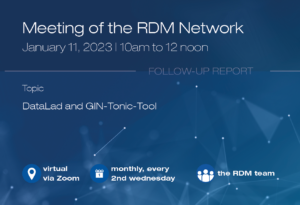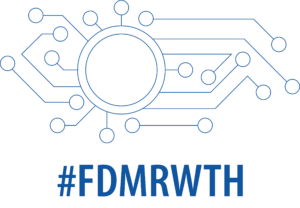
Source: Own illustration; Freepik
On January 11, 2023, the data stewards, RDM officers and RDM interested parties at RWTH Aachen University met for the first time in the new year for the regular Open Meeting of the RDM Network online via Zoom. The focus this time was on the two RDM instruments DataLad and the GIN-Tonic tool.
Speed dating as a small warm-up
The meeting opened with a round of RDM speed dating in form of short breakout sessions. Two participants at a time exchanged ideas on the following two questions: What RDM topic would you like to get involved in? Which topic would you like to learn more about during the year?
The background to this is the positive experience at the Research Data Day 2022. Now the RDM Speed Dating is to become a regular part of the network meeting. After all, the meeting is not only about RDM topics, but also about building a strong network.
What is DataLad?
The first talk was about the free and open source data management system DataLad. It is a command line tool that manages data, creates structures, ensures reproducibility, supports collaborative work and integrates into a widely used data infrastructure.
The whole thing is based on Git and Git-annex and enables version control of arbitrarily large files in data sets without the need for special data structures, a central infrastructure or third-party services.
The DataLad Handbook provides very detailed documentation of the tool as well as a guided course through its use.
Not meant for drinking: the GIN-Tonic tool
The second talk introduced the GIN-Tonic tool. Tonic was developed to extend GIN (German Neuroinformatics Node’s data infrastructure), a version control system for neuroscience data. However, the tool is not limited to GIN.
Basically, similar to DataLad, it is a tool to facilitate the (shared) management of research data. Building on Git and GitHub, the GIN Tonic tool provides research-specific tools to facilitate working with Git servers (GIN, GitHub or GitLab) in addition to the general usage features of these platforms. The Tonic application automates complex administrative tasks such as the creation of project repositories within an organisation and usage management.
Data can be modified either via the web server or via a special folder on the PC, which is synchronised with the server version. Every change is recorded by Git’s version control. Unlike Git and GitHub, the tool also supports large files without significant differences in the user experience.
The next open meeting of the RDM network – Save the Date
The next network meeting will take place as part of the Love Data Week. More information will follow soon here on the RDM blog.
Date: February 15, 2023
Time: 10am to 12 noon
Location: Zoom – Registration
Topic: Digital support in RDM.
Learn more
If you also want to become a part of the RDM network at RWTH, then subscribe to the mailing list “DataStewards@RWTH”.
If you have any questions about the RDM network or RDM in general, just write a message to the IT-ServiceDesk.The RDM Team looks forward to hearing from you.
______
Responsible for the content of this article is Sophia Nosthoff.





Leave a Reply
You must be logged in to post a comment.